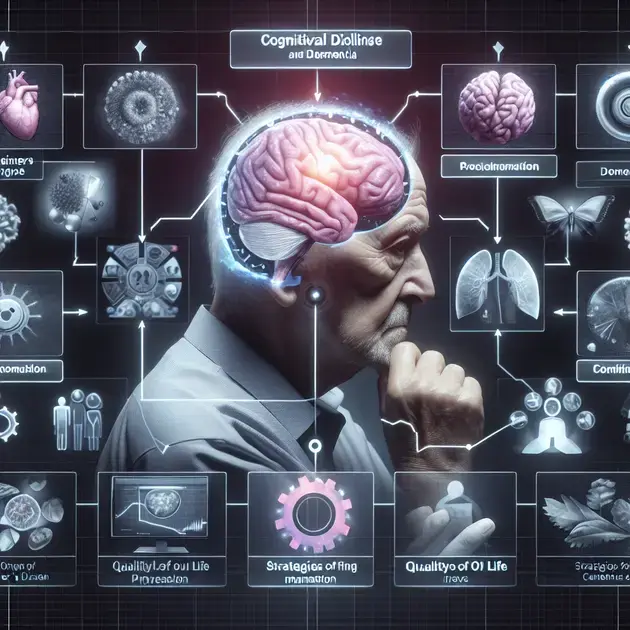Alzheimer’s disease and dementia are two closely related conditions that often get confused with each other. While both affect cognitive function, they differ in terms of causes, symptoms, and progression. Understanding the connection between Alzheimer’s disease and dementia is crucial for proper diagnosis and treatment.
Recent studies have shown that individuals with Alzheimer’s disease are at a higher risk of developing other forms of dementia, such as vascular dementia. This link underscores the importance of early detection and intervention to potentially slow down the progression of these neurodegenerative disorders. Staying informed about the relationship between Alzheimer’s disease and dementia can help individuals and their families make more informed decisions regarding healthcare and caregiving strategies.

The Distinction Between Alzheimer’s Disease and Dementia
Alzheimer’s disease and dementia are often used interchangeably, but it’s essential to understand the key differences between the two. While both conditions affect cognitive function, Alzheimer’s is a specific type of dementia. Alzheimer’s disease is a progressive brain disorder that leads to memory loss, cognitive decline, and behavioral changes. On the other hand, dementia is a broader term that encompasses various conditions that affect cognitive abilities.
To distinguish between Alzheimer’s disease and dementia, one crucial factor is the cause of each condition. Alzheimer’s disease is primarily caused by the accumulation of certain proteins in the brain, leading to the formation of plaques and tangles. In contrast, dementia can be caused by various factors, including vascular issues, Parkinson’s disease, and Lewy body dementia.
Another key difference is the progression of symptoms. In Alzheimer’s disease, memory loss is often one of the first noticeable symptoms, followed by difficulties in language, decision-making, and personality changes. Dementia, on the other hand, may present with a range of symptoms depending on the underlying cause, such as confusion, disorientation, and impaired motor functions.
Diagnosing the specific condition is crucial for developing an appropriate treatment plan. Physicians may use a combination of cognitive tests, brain imaging, and medical history assessments to differentiate between Alzheimer’s disease and other forms of dementia. It is important for individuals experiencing cognitive decline or their caregivers to seek medical advice for an accurate diagnosis.
Understanding the distinction between Alzheimer’s disease and dementia can help individuals and families navigate the complexities of these conditions and access the appropriate support and resources. By raising awareness and promoting early detection, we can improve the quality of life for those affected by these neurological disorders.
Exploring the Link Between Alzheimer’s and Other Forms of Dementia
Although Alzheimer’s disease is the most common form of dementia, it is essential to explore the connections between Alzheimer’s and other types of dementia. Different forms of dementia share common characteristics, such as cognitive impairment and memory loss, but each condition has distinct features and underlying causes.
One significant link between Alzheimer’s and other forms of dementia is the impact on brain function. Both conditions involve the deterioration of neuronal pathways and communication within the brain, leading to cognitive decline and behavioral changes. Understanding the shared mechanisms of these conditions can inform research and treatment strategies.
Genetic factors also play a role in the link between Alzheimer’s and other forms of dementia. Certain genetic mutations have been associated with an increased risk of developing Alzheimer’s disease and other neurodegenerative disorders like frontotemporal dementia. Research into genetic markers and risk factors continues to shed light on the complex interactions between different forms of dementia.
Exploring the link between Alzheimer’s and other forms of dementia can also provide insights into potential treatment approaches. Therapies targeting specific pathways involved in neurodegeneration may have applicability across various types of dementia, offering hope for improved outcomes and quality of life for patients.
By fostering collaboration among researchers, healthcare professionals, and advocacy groups, we can enhance our understanding of the link between Alzheimer’s and other forms of dementia and advance the development of innovative treatments and interventions.
The Importance of Early Detection and Intervention
Early detection and intervention play a crucial role in managing Alzheimer’s disease and other forms of dementia. Timely diagnosis allows individuals to access appropriate care, support services, and potential treatments that can help slow the progression of cognitive decline and improve quality of life.
One important step in early detection is raising awareness about the early signs and symptoms of dementia. Memory lapses, confusion, changes in mood or behavior, and difficulties with daily tasks can be indicative of cognitive impairment and should prompt further evaluation by a healthcare professional.
Screening tools, such as the Mini-Mental State Examination (MMSE) and the Montreal Cognitive Assessment (MoCA), can help assess cognitive function and detect subtle changes that may indicate the onset of dementia. These tests are often used in clinical settings to evaluate cognitive abilities and track changes over time.
Interventions aimed at promoting brain health and cognitive function, such as physical exercise, mental stimulation, and a healthy diet, can also play a significant role in delaying the onset of dementia and reducing the risk of cognitive decline. Engaging in activities that challenge the brain, such as puzzles, reading, and social interactions, can help maintain cognitive vitality.
Family members and caregivers also play a vital role in early detection and intervention by observing changes in their loved ones’ cognitive abilities and seeking professional guidance when needed. Building a support network and accessing resources for dementia care can provide essential assistance in managing the challenges associated with cognitive decline.
Ultimately, prioritizing early detection and intervention empowers individuals and families to take proactive steps in addressing cognitive health and promoting overall well-being. By advocating for regular cognitive screenings and implementing lifestyle strategies that support brain health, we can enhance our ability to detect dementia early and take meaningful action to improve outcomes. Harnessing the power of early intervention is key to enhancing quality of life for individuals affected by Alzheimer’s and other forms of dementia.

**The Progression of Cognitive Decline in Alzheimer’s Disease and Dementia**
Understanding the Development of Cognitive Decline
In Alzheimer’s disease and dementia, cognitive decline is a gradual process that affects memory, thinking, and reasoning abilities. Initially, individuals may experience mild forgetfulness and difficulty concentrating, which can progress to more severe symptoms over time. As the diseases advance, individuals may struggle to perform daily tasks and may have challenges with communication.
Research suggests that the progression of cognitive decline in Alzheimer’s disease and dementia is linked to the accumulation of abnormal proteins in the brain, such as beta-amyloid and tau. These proteins disrupt neuronal communication and lead to the death of brain cells, ultimately resulting in cognitive impairment.
Early detection and diagnosis of cognitive decline are crucial in effectively managing Alzheimer’s disease and dementia. By understanding the stages of cognitive decline, healthcare professionals can provide appropriate care and support to individuals and their families as the diseases progress.
The Impact of Cognitive Decline on Quality of Life
As cognitive decline advances in Alzheimer’s disease and dementia, individuals may experience a decline in their quality of life. Tasks that were once routine and familiar may become challenging, leading to frustration and feelings of helplessness. Social interactions may also be affected, as individuals may struggle to remember names, faces, or important events.
The emotional toll of cognitive decline cannot be understated, as individuals may experience feelings of isolation, depression, and anxiety. Family members and caregivers may also face challenges in providing care and support to their loved ones as the diseases progress.
It is essential for healthcare professionals to address not only the physical symptoms of cognitive decline but also the emotional and psychological impact on individuals and their families. By providing comprehensive care that includes emotional support and therapy, the overall quality of life for individuals with Alzheimer’s disease and dementia can be improved.
Strategies for Managing Cognitive Decline
There are various strategies and interventions that can help manage the progression of cognitive decline in Alzheimer’s disease and dementia. Cognitive stimulation activities, such as puzzles, memory games, and music therapy, can help keep the brain engaged and active.
Additionally, lifestyle modifications, such as a healthy diet, regular exercise, and social engagement, can play a significant role in slowing down cognitive decline. Proper medication management and regular medical check-ups are also essential in monitoring the progression of the diseases and adjusting treatment plans as needed.
By implementing a multidisciplinary approach to care that focuses on both medical and non-medical interventions, individuals with Alzheimer’s disease and dementia can receive comprehensive support to enhance their quality of life and well-being.
**
Conclusion
**
Understanding the progression of cognitive decline in Alzheimer’s disease and dementia is crucial in providing effective care and support to individuals and their families. Research indicates that the gradual deterioration of memory, thinking, and reasoning abilities is intricately linked to the accumulation of abnormal proteins in the brain, contributing to cognitive impairment over time.
As cognitive decline advances, the impact on the quality of life becomes increasingly profound. Tasks that were once routine may become challenging, leading to frustration and a sense of helplessness. Social interactions are also affected, with individuals experiencing difficulty in remembering names, faces, or important events, often resulting in feelings of isolation and anxiety.
Implementing strategies such as cognitive stimulation activities, lifestyle modifications, and a multidisciplinary approach to care can significantly aid in managing cognitive decline. By engaging in activities that keep the brain active, maintaining a healthy lifestyle, and seeking medical guidance, individuals with Alzheimer’s disease and dementia can potentially slow down the progression of cognitive decline and enhance their overall well-being.